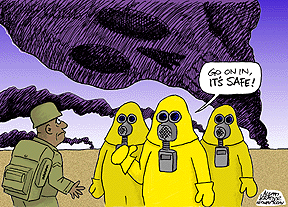 By Kim Sengupta, Independent UK. Posted on AlterNet November 20, 2008
By Kim Sengupta, Independent UK. Posted on AlterNet November 20, 2008
A landmark investigation into the causes of Gulf War syndrome has concluded that the illness was caused by troops being given nerve gas pills and exposed to pesticides.
The study in the United States, mandated by Congress and described as one of the most wide-ranging undertaken on the subject, found that the most likely cause of the illness was pyridostigmine bromide (PB) in protection pills given to American and British troops to counter the Soman nerve gas Saddam Hussein could have used in the 1991 Gulf War. U.S. soldiers were also affected by neurotoxins in pesticides extensively used in preparation for operations.
The findings led to immediate calls for official action on both sides of the Atlantic. In the UK, troops’ welfare groups said the British Government must do more to help those affected and carry out its own comprehensive research. The British Government has insisted there is not enough scientific evidence so far to prove the existence of Gulf War syndrome. But it has agreed to offer war pensions to members of the forces who became ill after serving in the first Gulf war. About 6,000 British service personnel, out of 55,000 mobilized for the conflict, are reported to be suffering from the symptoms of Gulf War syndrome. Many were medically discharged from the forces and have had to give up subsequent civilian jobs due to ill health. The Royal British Legion demanded that a payment of £10,000 be made to each veteran suffering from the ailment in compensation for a failure of duty of care.

